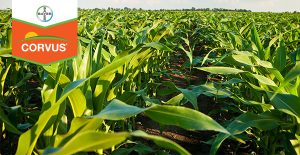 The Things Network is working to build a global Internet of Things network. They took a step closer to that goal when they helped a team of collaborating companies connect a Vinduino agricultural sensor station to the eVineyard application via a long-range wireless data connection.
The Things Network is working to build a global Internet of Things network. They took a step closer to that goal when they helped a team of collaborating companies connect a Vinduino agricultural sensor station to the eVineyard application via a long-range wireless data connection.- The Purdue Agricultural Data Engine (PADE) is a new, online tool developed by Purdue University engineering professor, Dharmendra Saraswat, that allows farmers to process data from their fields without the need to share information with a third-party company.
- The premier golf and sports turn brand in the BRANDT product portfolio is being re-named. Grigg Brothers will now be known simple as GRIGG.
- Matt Hesse will serve as the Chief Executive Officer at FieldReveal, a joint venture created by Wheat Growers, Landus Cooperative, Central Valley Ag and WinField United to provide the next generation of precision agriculture tools and capabilities.
Executive Address From Liam Condon, Bayer
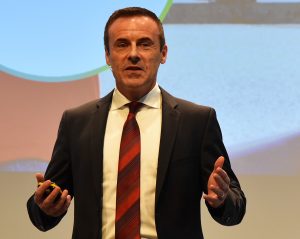 During the 2017 Bayer Future Farming Dialog we heard an address from Liam Condon, President, Crop Science, a division of Bayer.
During the 2017 Bayer Future Farming Dialog we heard an address from Liam Condon, President, Crop Science, a division of Bayer.
Focusing in his speech on sustainable agriculture, Liam Condon also reaffirmed the commitment of the Crop Science Division to investing in innovation and developing customized agronomic solutions for farmers that address their individual needs and challenges.
In this context, Condon emphasized that the proposed acquisition of Monsanto presents a tremendous opportunity to positively shape the future of farming. “It is our responsibility to ensure that innovation is made available to farmers large and small, all over the world. Only then can we make a meaningful contribution to ensuring a sustainable world food system.”
Condon says that the current expectation of closing the acquisition of Monsanto is in early 2018.
Please listen to Liam’s address to hear more: Liam Condon Address
I broadcast the address live on the AgWired Facebook page (about 3am Central time U.S.) and you can watch it below:
Moving Beyond “Farm to Table” Discussion
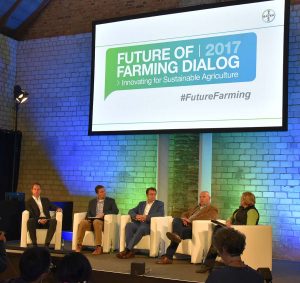 During the 2017 Bayer Future of Farming Dialog the first panel discussion focused on Moving Beyond “Farm to Table”: Understanding the Food Supply Chain. Moderating was Stephan Brunner, who works on food chain partnerships for Bayer. Also on the panel are Karen Buch, RDN, LDN, President/Founder, Nutrition Connections; Ben Burgers, Food Safety Manager/Agronomist, Roveg Fruit BV; Andreas Lenz, Managing Director, DHL Food Logistics and Wilbert van Wijk, Grower, Van Wijk Fruit.
During the 2017 Bayer Future of Farming Dialog the first panel discussion focused on Moving Beyond “Farm to Table”: Understanding the Food Supply Chain. Moderating was Stephan Brunner, who works on food chain partnerships for Bayer. Also on the panel are Karen Buch, RDN, LDN, President/Founder, Nutrition Connections; Ben Burgers, Food Safety Manager/Agronomist, Roveg Fruit BV; Andreas Lenz, Managing Director, DHL Food Logistics and Wilbert van Wijk, Grower, Van Wijk Fruit.
In the discussion you’ll hear their ideas on what will be needed in the future for a successful agricultural supply chain for all stakeholders. In my interview with Stephan he sums up some of the key points or take aways from the panel.
First panel discussion: Moving Beyond “Farm to Table”: Understanding the Food Supply Chain – Panel Discussion #1
First panel moderator – Stephan Brunner, Global Key Relations Manager, Crop Science, a division of Bayer – Takeaways: Interview with Stephan Brunner, Bayer
Corvus: Understanding Reactivation
The success of Bayer’s Corvus herbicide goes beyond residual activity. What sets it apart from others in the same class is reactivation, which allows weed control in the absence of moisture, says Mark Waddington, product development manager for selective corn herbicides.
“All herbicides take water or moisture or rainfall to control weeds. That’s how you get your residual control. The herbicide prevents the weed from emerging, prevents it from germinating,” says Waddington.” What makes Corvus different is as those dry periods happen, the weed will emerge, you get another activating rainfall and the herbicide in Corvus will be taken back into the plant and take down what has emerged.”
Waddington says Corvus is taken in through the roots and the shoots of the plants, while others are taken in just through the roots. The reactivation component allows for better overall weed control, which adds to the farmer’s bottom line.
Listen to Jamie’s interview with Josh VanDeWalle and Mark Waddington at the 2017 Farm Progress Show: Interview with Josh VanDeWalle and Mark Waddington, Bayer
View all photos from FPS here: 2017 Farm Progress Show Photo Album
GROWMARK’s FS Simulator Makes Training Fun
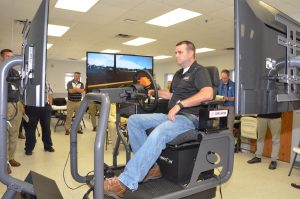 GROWMARK’s FS applicator simulator was on display for media this week in Bloomington, IL. The simulator was created as a training module for FS System operators to practice, study, and enhance their ability, knowledge, and safety skills.
GROWMARK’s FS applicator simulator was on display for media this week in Bloomington, IL. The simulator was created as a training module for FS System operators to practice, study, and enhance their ability, knowledge, and safety skills.
“To the best of my knowledge, this simulator is the first of its kind in agriculture being used for training,” said Erik Wilcox, GROWMARK manager, crop protection application and equipment. “We continue to identify ways to develop best-in-class operators, and this is one part of our System’s robust training program.”
With the focus on teaching efficiency and not selling machines, Wilcox said the simulation truly puts you in a real environment. The random obstacles give trainees new challenges each time they sit down. Modules include a road course, a basic field navigation, and an open course. Three screens give operators a full view of surroundings, steering wheel and controls guide the booms and machine’s direction and speed, and the mechanical seat moves to simulate real-life bumps and turns.
Listen to all the details from my complete conversation with Erik here: Interview with Erik Wilcox, GROWMARK
View and download photos from the event here: GROWMARK FS Simulator Media Event Photo Album
Biostimulants World Congress Coming to Miami
 The use of biostimulants in agriculture has grown dramatically over recent years and could reach $2 billion by next year, but there is still much that needs to be learned about the diverse formulations on the market and being developed that are applied to plants or soils to regulate and enhance the crop’s physiological processes.
The use of biostimulants in agriculture has grown dramatically over recent years and could reach $2 billion by next year, but there is still much that needs to be learned about the diverse formulations on the market and being developed that are applied to plants or soils to regulate and enhance the crop’s physiological processes.
The 3rd Biostimulants World Congress coming up November 27-30 in Miami is an international scientific and technical congress that was specifically designed to review the latest information about these products. Professor Patrick Brown with the Department of Plant Sciences at UC Davis is the chairman of this Congress, which he says was developed to answer growers’ questions about the efficacy of biostimulant products.
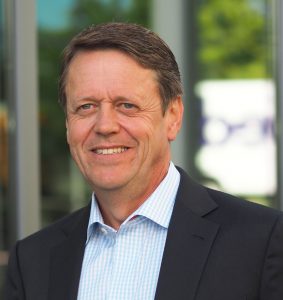 “Many growers were suspicious of these products, thinking of them as snake oils or magical elixirs,” said Brown, who said his interest in working with New Ag International in starting the conference was to help growers make their decisions and to determine which products were truly valuable. The congresses are also helping provide information for decision-makers around the globe when it comes to legislation and regulations impacting biostimulants, which can help protect the R&D investments of manufacturers in a segment where IP protection is difficult.
“Many growers were suspicious of these products, thinking of them as snake oils or magical elixirs,” said Brown, who said his interest in working with New Ag International in starting the conference was to help growers make their decisions and to determine which products were truly valuable. The congresses are also helping provide information for decision-makers around the globe when it comes to legislation and regulations impacting biostimulants, which can help protect the R&D investments of manufacturers in a segment where IP protection is difficult.
The first congress was held in Strasbourg, France in 2012 and the second in 2015 in Florence. “We build the conference around five or six world experts on all aspects of plant growth and soil science,” Brown said. Among this year’s speakers are Professor Raj Khosla of Colorado State University, who will discuss Precision Agriculture and Biostimulants, and EPA scientist Dr. Russell Jones, who will speak about regulatory guidance on plant biostimulants in the U.S. The Congress will be held as scheduled in the Hyatt Regency Hotel in Miami, which was not damaged by Hurricane Irma.
Find the program and get registration information at BiostimulantsWorldCongress.com and learn more in this interview: Interview with Patrick Brown, Biostimulants Congress Chair
Would Your Soil Pass the Tighty Whitey Test?
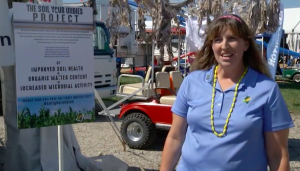 The Illinois Corn Growers Association had a head turning display at the 2017 Farm Progress Show centered around soil health. The question is, would your soil pass the tighty whitey test?
The Illinois Corn Growers Association had a head turning display at the 2017 Farm Progress Show centered around soil health. The question is, would your soil pass the tighty whitey test?
“Search #SoilYourUndies online and you will find how farmers from all over the U.S. and Canada are taking this approach to learning more about soil health. The better health a soil is in equals more microbiological activities. We would anticipate soil which has been under cover crops, no-till systems or pastured would have higher soil health if measured by microbial activity and organic matter,” explained Tricia Braid, director of communications, Illinois Corn.
Braid said the white cotton underwear buried in conventional fields were more intact than their counterparts buried in soil with more active microbes. A simple and very visual example of how improved soil health combined with organic matter content will equal increased microbial activity.
Listen to or download my complete chat with Tricia here: Interview with Tricia Braid, Illinois Corn Growers Association
Bayer Advancing Toward the Next Era of Ag
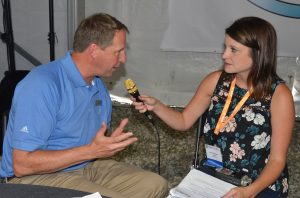 Bayer offers a great deal of technology in today’s marketplace, with a pipeline of new technologies coming to growers in the future.
Bayer offers a great deal of technology in today’s marketplace, with a pipeline of new technologies coming to growers in the future.
“We’re reinvesting into agriculture. We’re reinvesting into growers,” says Rob Schrick, Bayer Strategic Business Lead for North American Corn and Soy. “We’re taking our returns and hiring scientists and putting scientists to work to not only bring the next chemistry, but maybe bring the next trait or bring that next soil microbe that’s going to help the grower improve his efficiency and improve his end of the day profit.”
Schrick believes digitization and the ability to target challenges down the square foot in a farm field represents the future of the industry. He says breakthroughs in data collection and management will help the next generation of growers to reach higher yields while improving sustainability.
Listen to Jamie’s interview with Rob Schrick at the 2017 Farm Progress Show: Interview with Rob Schrick, Bayer
View all photos from FPS here: 2017 Farm Progress Show Photo Album
Precision Ag Bytes 9/13
 AgGateway will hold a new “Seed Quick Connect” session for agricultural retailers, distributors and manufacturers to determine where and how they can better connect electronically to streamline their seed transactions. This meeting is part of AgGateway’s Annual Conference, November 6-9 in San Diego.
AgGateway will hold a new “Seed Quick Connect” session for agricultural retailers, distributors and manufacturers to determine where and how they can better connect electronically to streamline their seed transactions. This meeting is part of AgGateway’s Annual Conference, November 6-9 in San Diego.- Bayer has announced 100 cotton growers have qualified for the inaugural class of the FiberMax Maximizer Club and 129 have joined the Stoneville Legacy Club.
- Farm Bureau and John Deere are working together to give Farm Bureau members in participating states special access to John Deere’s GreenFleet Loyalty Rewards program. The program provides equipment discounts, parts savings, home and workshop product discounts, and special member promotions.
- Six Missouri farms have joined the Soil Health Partnership. They join more than 100 others in 9 states in a move that could increase the adoption of agricultural best practices and sustainability in Missouri.
- Soil Health Institute’s 2nd Annual Meeting in St. Louis, Missouri wrapped up, but if you missed it you can get caught up with the 2nd Annual Meeting Report. Share clips on your social media network or watch video clips from the event on the YouTube channel.
GROWMARK Committed to Nutrient Management
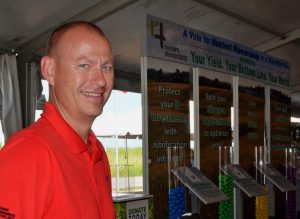 Nutrient management was a focus of GROWMARK’s exhibit at the 2017 Farm Progress Show in Decatur. The regional cooperative has spearheaded a number of initiatives to help farmers learn more about nutrient management strategies and to assist them in executing those practices on their farms.
Nutrient management was a focus of GROWMARK’s exhibit at the 2017 Farm Progress Show in Decatur. The regional cooperative has spearheaded a number of initiatives to help farmers learn more about nutrient management strategies and to assist them in executing those practices on their farms.
“The main thing we do when we’re working with customers is trying to help them with nutrient management plans, strategies in order to overall reduce the amount of nutrients they’re using in order to get the most output,” says Ryan Hasty with South Central FS. “The main goal is to maximize their yields and do that with the least amount of nutrients to get that yield goal.”
Programs like the 4R4U partnership with county Illinois Farm Bureaus and the N-Watch program for nitrogen management are examples of how GROWMARK is helping its customers.
Listen to Cindy’s interview with Ryan Hasty at the 2017 Farm Progress Show: Interview with Ryan Hasty, South Central FS
View all photos from FPS here: 2017 Farm Progress Show Photo Album

